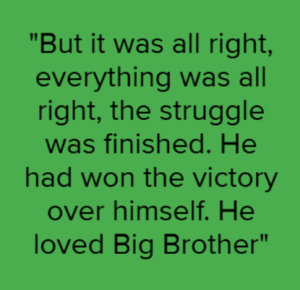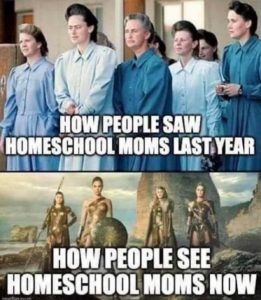Socialization is the reason we homeschool.
People used ask me all the time why we homeschool. These days, everybody knows why, and I’m more likely to receive their apologia as to why they don’t than queries as to why we do. I have a book’s worth of good material after many years of answering that question. I get bored easily, so I’ve made a game of trying never to use the same answer twice. Here are just a few of our reasons, all of them true and worthy:
- We believe it is our responsibility as Christians to give our children an unsullied Christian worldview.
- We want to be more involved in our children’s lives than the school schedule can permit.
- We enjoy hanging out with our kids.
- We want to avoid bullies and bad influences.
- We want better, more personalized academic choices.
- We don’t want to get out of bed early enough to catch a school bus.
- We certainly do not want to have to drive and drop off that many children at two or more schools every day.
Can you imagine getting a large-family number of kids ready for school every day? *shudders*
We’ve found so many good reasons to homeschool over the years–some weighty, some very light indeed–that I’ve never had to really explain what my own First Cause was. The more distance I get between my first inkling that we would homeschool (pretty closely following the day I found out I was pregnant for the first time) and today’s understanding (after 21 years of motherhood, I could list literally a thousand reasons to homeschool), the more I realize that the answers we usually give are, while perfectly fine, much lower in importance than the one I’ve kept closer to my heart, where the idea–nay, the heart-need–started.
Of course, nothing can be higher on the list than the desire to please our Father in Heaven, but this need flows directly from that, as it concerns the spiritual and emotional well-being of children. It really does all come down to that question most annoying to all homeschoolers: What about socialization?
The truth is, everybody is socialized.
After nearly a couple of decades of homeschooling, after seeing the differences in the way hand-raised children and schooled children behave, and after the massive explosion of homeschooling since 2020, I had naively thought the socialization question would be put to bed for good. It’s been a few years since anybody asked me about that–so long that I don’t even have any posts on the new version of the blog that I can quote or link to. But someone worried recently to one of my teenagers, during an ironically cordial and lucid conversation that gave the lie to the very words coming from the lady’s mouth, that she and her siblings are not properly socialized.
My teen looked the person in the eye, argued clearly her own opinion, and came away from the situation with the respect of the questioner. Is that not good socialization? How about the ability to work a grown-up job among people who swim in the main stream, and remain on good terms with everybody and get the job done well? Is that socialized enough? Able to speak with and relate to people in all stations and stages of life? Able to see the world entirely through a Christian lens? I certainly haven’t witnessed that kind of socialization among very many public schooled kids!
I’ve concluded that what they mean by “socialized” is “made compliant with my group”. One Boomer even called my daughter “brainwashed” over something very mild indeed: a disagreement over whether the piano she plays needs to be replaced or not. It didn’t make sense in the context of the conversation, so I can only conclude that this is just what he thinks of our family generally. I could recount other proofs of this attitude around us, but that will suffice.
If conformity with a group is the kind of socialization they mean, I’m happy to inform them that, yes, my children are socialized very well indeed. They’re just not socialized to the System.
System Kids
My daughter (the same one) was recounting a conversation she’d had with a co-worker recently. She is not at all shy about telling people that when she “grows up”–she’s pretty grown up already–she wants to be just a mommy. One co-worker of hers said at some point, in an apparent dig at the girl I’m so proud of, that she was going to go get a “big-girl job”. We both kinda laughed that off. Working women have no idea how immature and clueless homemakers often find them–with their girl-dinners and big-girl-panties and girl-bossing–and their apparent complete inability to imagine what they would do with themselves all day without somebody clearly defining their role in the System. I knew a mom once who couldn’t break the programming. She left the SAHM life because, and I quote verbatim, “I just want somebody to tell me what to do.”
I was thinking about that girl-language today’s young women use. Always girls, hardly ever women, and certainly never ladies. In fact, “ladies” seems to be a condescending, angering word to many of them. I’ve gotten some looks for saying “Hi, ladies!” to groups of younger females. Why do they react this way?
I think I’ve worked out why: This is the language they have to use to soothe and motivate themselves, because it is the language their own parents and teachers used to soothe and motivate them. As they cried not to get on the school bus, or not to go to the daycare, or not to have to go to school while they were facing their first periods, they had to ignore every felt need and go be big girls now. As they shed all of their feminine nature to go out into the world and do what they’ve been made to do since the first day they went to kindergarten, they learned to invert what it even is to grow up into a woman.
They are adults, but they were never given a chance to actually grow up. They were trained, indoctrinated, and sexualized, but not grown up. They’re the System’s kids and most of them always will be. Every day, they have to remind themselves that they are big girls, so they can go out to do what big girls do.
My Story
When I was a little girl, my mom stayed home with us until we children went to kindergarten. She was and is a gentle and sweet soul. I don’t know if anybody could embody motherly love better than she has. I mean none of this to blame her for not homeschooling me in a day when very few had ever even heard of such a thing. She was making her best choices with the information she had, and I have done the same.
I remember the first day I got on the bus. I was as excited as any child could be. Then when I got off the bus at the end of the day, happy but relieved to be home, I heard a bunch of the big kids laughing at me. Not having been told what apparently every other child was born knowing, I had come around the back of the bus instead of the front, and that provoked some very loud laughter and name-calling through the open window.
I realized then for the first time, very poignantly, that there were strangers about. I didn’t know any of these people, nor did I feel safe around them. I didn’t know the word “dehumanized” yet, but that’s how I felt. I don’t have many more school memories until second grade, in Mrs. Tugman’s class, so I guess the rest of the next two years was fine.
Mrs. Tugman spanked me a lot. She spanked everybody. I’m sure I’m not the only one who received her mistreatment. But that year, I was the literal whipping boy girl. Everybody else was left alone after she decided I was the kid who really needed her attention.
The first time she paddled me, it was because I had repeatedly gotten a math problem wrong. I wasn’t paying attention to my symbols, and just kept adding instead of subtracting every time she sent it back to me. It was a two digit plus two digit problem, and I was so focused on the carrying that I didn’t notice I was doing the wrong operation. She certainly could have just pointed that out to me, but she was hell-bent on making me guess why I was getting it wrong over and over and over. After she spanked me, I understood my mistake, so I guess she decided I was keeping my brain in the seat of my pants, and that was the only proper way to deal with me thereafter.
The other times she spanked me, though, it was for crying. I didn’t make many more math mistakes after that. But I displayed anxiety, and she got angry about that. Which, of course, led to more anxiety. Now, understand, I was not throwing temper tantrums. I was trying to hide the fact that I was about to cry.
I was scared. I was scared I’d get on the wrong bus. I was scared that one of the big kids on the bus would be cruel to me. There had already been hints that there were ugly things going on in the back of the bus that I didn’t understand, so I was scared there’d be no seat near the front by the time I found my bus. I was scared my mom wouldn’t be home when I got there. She always was, but my imagination disposed of her in a thousand different ways between the time I left home and the time I got back. I was scared I was going to mess up another math problem. I was simply scared, all the time. You can say, as many did and more will when they read this, that a child has to learn not to be scared. But those were rational fears. I wasn’t scared of an alien abduction. I was scared of real dangers, but had no agency to remove myself from the threat in any way. I was six, and I was alone. My only authority figure didn’t care about me, and in fact actively despised me.
Thankfully, we changed schools in the middle of that year and went to what I still believe was a very good school, as schools go. I often wonder who Mrs. Tugman turned her baleful eye on after I was gone. The other children at this school, save those few that I knew as neighbors, were unpredictable, and often cruel because I was quiet. I was gifted, and the teachers saw that, so I was really blessed in a way that other kids might not have been. I was allowed to sit outside the classrooms to draw or write, or go to the library and read books at my own level. I was allowed to go tutor smaller children, with whom I was not at all scared to engage, as long as I understood the purpose for it.
I was a particularly sensitive and imaginative kid, and school made me extremely anxious. It made me so anxious that I had full-blown selective mutism. I became an object of interest to the school psychologist, who spent an hour or two every week with me. I could not speak in this unsafe place. No amount of smiling and encouraging by my teachers was ever enough to break my silence.
I’m not telling you this because I think I was some kind of special kid. I wasn’t. That’s my whole point. I went on to have some good teachers and some bad. I learned to hide in books and imaginations of my own. I learned to talk later on, too, though it was always forced. Sometimes forcing myself to speak turned to anger instead of tears, getting me into trouble and confusing everybody involved, including myself. I made good grades. In a lot of ways, I adapted just like every other kid.
Finally, I had been socialized.
I was stuffing real, earnest needs away because nobody would address them. How could they? I couldn’t even articulate them! I’m not the only child that ever went through that, not by a longshot. Every child being thrown into an impersonal crowd of other children with barely an adult in sight is going through this at some level. They just either don’t feel it or, when they do, they are easily convinced that this is the way it should be. I simply had a more introspective nature, a better vocabulary with which to store up my thoughts, and a willful nature that would not accept explanations that didn’t fit my observations. By the time I got home, I was able to forget everything and be a happy kid! So down in the memory-hole all that feeling would go, until the next morning. My parents never even knew anything was wrong. I got “sick” a lot. Stuffing feelings does that to a child. They’re not malingering. They’re heartsick.
Ripping me from my family at that stage was completely developmentally inappropriate. It was a real trauma. But it was not just developmentally inappropriate and traumatic for me.
Every Child’s Story
This education system is developmentally inappropriate to all children. I was just more sensitive to it. I understood, in a way that escapes most 6 year-olds, that I was in a place full of strangers who only “cared” for me because they were paid to, who had me jump through their hoops because they were the only hoops they had. Dress what a teacher does up in however many lovely words you like, the fact is that there is no personal relationship to be had there. If there is a personal relationship, it is inappropriate. But children are persons! Young children need close contact with the real love of a mother for much longer, both in years of age and in hours spent each day, than they are allowed in this system.
Now, I did have teachers who were perfectly lovely people, and Christian in their intentions. I consider my education to have been very good for the poor region we lived in. It was fairly Christian, even, and especially good compared to what the schools teach now. But that the classroom is a stultifying and impersonal place, that smothers learning and the human connection was still true, even in those very good schools.
I could only be in a given teacher’s class for a year, sometimes two because the classrooms were mixed-grade, and then I would move on. Then in high school every subject was taught by a different teacher. Even there, I was again lucky to be in the gifted classes so that the teachers got to know us in a more intimate way. But I was marked to be a hoop-jumper, a test-taker, a problem to be solved, even there. Never a soul really knew me. The System only cared about getting me on the track that would program me for its own best use.
I resented that depersonalization of my Self very deeply, so when the time came to begin to teach my own children to read, write, and think, I committed to their spiritual and emotional well-being above all of their academic needs. We can do all that school stuff, that career stuff, but it will never be the true goal. I want my children to feel known. I want them to feel safe, and not traumatized into compliance with the System.
Public school is destructive to the finer nature that many children are born with. It is probably nature, much more than nurture, that makes a child sensitive or hardy. I won’t try to figure out in this post how most kids go through that grinder without breaking down as obviously as I did. Lots of reasons are worth exploring in another post, perhaps. The fact remains that those other children are being robbed of intimacy, too, whether they seem happy or not. I feel like one of the lucky ones because I was unable to finally, fully assimilate like the rest.

Many will read this and say “Well, I came through it just fine! In fact, it was good for me!” They believe that only because their indoctrination–one might call it brainwashing–was indeed completed. They became the System’s kids.
Many more children go into school sensitive and thoughtful than come out of it that way.
The System, from the first day that sweet little guy walks into kindergarten, works to rough up the very finest mind into the only kind of material the Machine can use: coarse and unthinking. He’ll learn all the alphabet, and something else besides: that his needs must be subsumed to the needs of the whole classroom. He is never anybody’s first concern. It is the separation from the family, and especially a loving mother, that does the most harm to a child’s spiritual development. I don’t care how Christian or kind you think his teacher is. He is being taught to be someone other than who he is in Christ, and in his family, his first little Church. He can’t help but become something else, because they can’t know him to begin with.
That is my whole first reason for homeschooling. I don’t want my children to be the System’s children. I want them to be mine. I want them to be their own. And I want them to be God’s.



